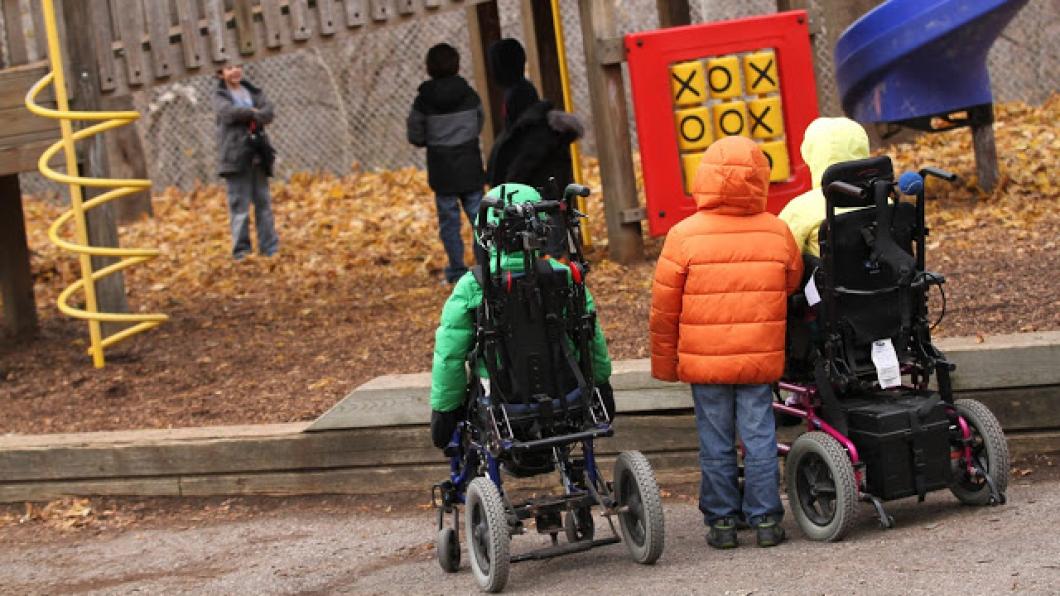
What one mom did to get her disabled son on the playground
Andrea Davila is leading a project that’s raised over $500,000 to build a barrier-free playground at Deer Park Public School in Toronto. Andrea’s nine-year-old sons—twins Tomas and Martin Tobin—attend the school and love it. But Tomas, who uses a wheelchair, is unable to get into the current playground (see photo above): it’s bounded by large stepped logs and covered in wood chips. So Tomas sits on the sidelines, watching. Tomas is part of the Intensive Support Program (ISP) at Deer Park, which supports kids with a variety of physical disabilities. “Right now there’s nothing for these kids to play on outdoors, no accessible equipment and nothing they can enjoy,” Andrea says. We spoke about her role in bringing a barrier-free playground to life.
BLOOM: How did you get the idea?
Andrea Davila: A teacher who used to work in the ISP program had an idea to build a $50,000 gazebo with a ramp. After he left I said ‘I think we should continue with this idea’ and I took it to the parents’ association.They said ‘$50,000, are you crazy?’ Nothing that high had ever been raised for a project and it was outside what they usually supported. They started asking questions and when I told them there were only 12 students in the ISP program, they didn’t think the numbers warranted it. I said ‘It’s something that every single kid in the school and community can use.’
BLOOM: How did the project expand from a gazebo to a playground?
Andrea Davila: We found a huge potential space of land that wasn’t being used at the school, and it had great potential. We asked the Toronto District School Board (TDSB), ‘what do we need to do?’ They said you need a landscape architect, a design and a topographical survey. That would cost about $10,000.
BLOOM: How did you raise the first $10,000?
Andrea Davila: Pizza lunches, bake sales and a skate-a-thon. It took about a year.
BLOOM: Who is working with you on the project?
Andrea Davila: Two other parents whose children don’t have disabilities.
BLOOM: Were the other parents of kids with disabilities supportive?
Andrea Davila: Not much. They were interested, but they never showed much support. It wasn’t easy to find volunteers for this project.
BLOOM: Can you describe the plans for the playground?
Andrea Davila: It will have accessible equipment like a rotating climber that is low to the ground; special-needs ‘dish’ swings; and basketball hoops at different levels so kids in wheelchair and regular kids can throw to different heights. There will be an art and music area to support the kids with sensory issues. We’ll have raised sand tables, a wider slide so that a parent with a kid with a disability can support their child, drums and xylophones and lots of trees and areas with natural elements like wood and rocks that are safe. There will be picnic tables that are higher so a wheelchair can go under. The idea is to integrate and include everyone. Our goal is that children of all abilities will play together.
BLOOM: Why did you want to be a part of this?
Andrea Davila: I got inspired by the teacher who wanted to do something for the kids in this program and because of my perspective as a parent of a child with a disability. I knew what would make it barrier-free and easy to access—I knew about the things we have loved in other places. Right now the school doesn’t have an outdoor play area that can engage Tomas in any fun activity. It’s not easy to see every kid playing and having so much fun and my kid just sitting and watching.
BLOOM: What is the cost of the project?
Andrea Davila: The project is estimated to cost $775,000. To date we’ve raised over $560,000. The city of Toronto loved our project and our councillor helped us raise $350,000 from the city. The TDSB gave us $45,000 because for full-day junior and senior kindergarten they need to improve the outdoor area and this project matched that perfectly. The Toronto Eglinton Rotary Club gave us $36,000. And the rest—$130,000—has been raised through the school, including an amazing anonymous donation from a family. We’ve run pizza lunches, a skate-a-thon once a year, two dance-a-thons a year and many bake sales, and the fun fair at the school supported us. Because the project isn’t fully funded yet, we decided to do it in phases. We hope to break ground in spring 2016 with phase one, which is our biggest phase.
BLOOM: What advice would you give other parents wanting to raise funds for accessible playgrounds?
Andrea Davila: Don’t think only about your school, but the community overall, and that includes the elderly. Our playground is a combination of pavement and rubber surface so people using wheelchairs or walkers or crutches can go everywhere. Look for advice from other schools that have successfully raised money. We asked Maurice Cody, which had raised $400,000 to build a turf, and they really helped us. We partnered with The Toronto Foundation for Student Success, which is an independent charitable foundation of the TDSB. They act as financial trustee for the project. They helped us create online donations. We got in touch with an accountant at the TDSB and he created an account so that all of our funds could be in one account. Find lots of volunteers because you can’t do this on your own. And it’s ideal if you can find people with experience in fundraising and marketing and communications.
BLOOM: How do you feel about the success you've had?
Andrea Davila: I think it’s very successful so far, but it’s not finished, and I won’t feel any success until it’s actually built. It’s been really hard work and team work and involved many people.